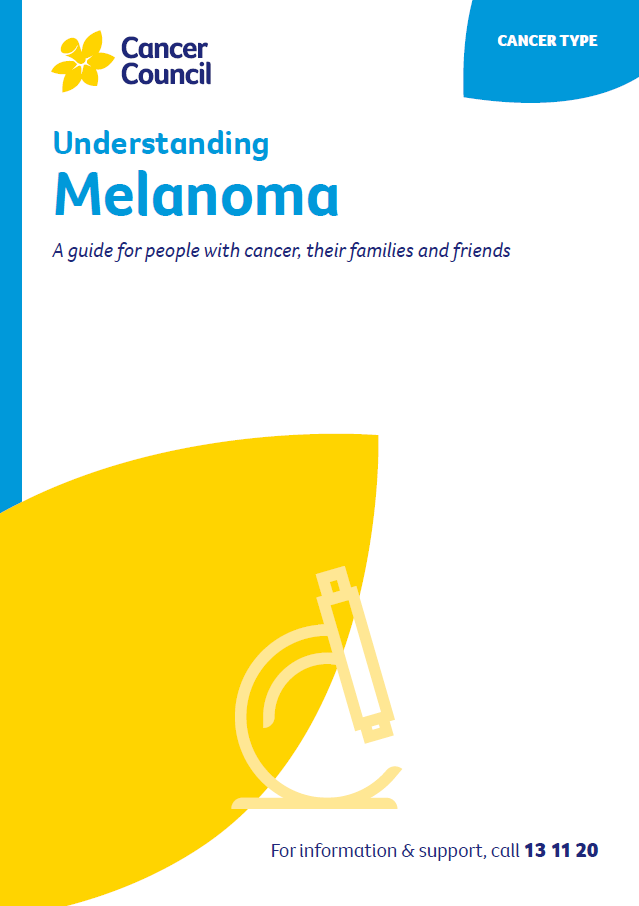Staging and prognosis for melanoma
Learn about staging and prognosis for melanoma to better understand how far the cancer has spread and treatment decisions.
Learn more about:
Staging melanoma
The pathology report and any other test results will show whether you have melanoma and whether it has spread to other parts of the body.
Called staging, it helps your team recommend the most appropriate treatment for you. The melanoma will be given an overall stage of 0–4 (usually written in Roman numerals as 0, I, II, III or IV).
Stages of melanoma
| stage 0 (in situ) | The melanoma is confined to the top, outer layer of the skin (epidermis). | very early or localised melanoma |
| stage 1 | The melanoma has not moved beyond the primary site and is less than 1 mm thick with or without ulceration, or 1–2 mm thick without ulceration. | early or localised melanoma |
| stage 2 | The melanoma has not moved beyond the primary site and is 1–2 mm thick with ulceration, or more than 4 mm thick with or without ulceration. | early or localised melanoma |
| stage 3 | The melanoma has spread to lymph nodes near the primary site, to nearby skin or to tissues under the skin (subcutaneous). | regional melanoma |
| stage 4 | The melanoma has spread to distant skin or subcutaneous tissues and/or other parts of the body, such as the lungs, liver, brain, bone, or distant lymph nodes. | advanced or metastatic melanoma |
Genomic testing
If the melanoma has spread (stage 3 or 4), you may have genomic tests for a particular gene change (mutation). These gene mutations are due to changes in cancer cells – they occur during a person’s lifetime and are not the same thing as genes passed through families.
About 50% of people with melanoma have a mutation in the BRAF gene, which makes the cancer cells grow and divide faster. About 15% have a mutation in the NRAS gene, which controls how cells divide. C-KIT is a rare mutation affecting less than 4% of people with melanoma.
Genomic tests can be done on the tumour tissue sample removed during surgery. The test results will help doctors work out whether particular drug therapies may be useful.
Prognosis
Prognosis means the expected outcome of a disease. You may wish to discuss your prognosis and treatment options with your doctor, but it is not possible for anyone to predict the exact course of the disease. Instead, your doctor can discuss any concerns you may have.
Melanoma can be treated most effectively in its early stages when it is still confined to the top layer of the skin (epidermis). The deeper a melanoma grows into the lower layer of the skin (dermis), the greater the risk that it could spread to nearby lymph nodes or other organs.
In recent years, newer drug treatments such as immunotherapy and targeted therapy have improved the prognosis for people with melanoma that has spread from the primary site (advanced or metastatic melanoma) or is at very high risk of spreading.
→ READ MORE: Your health care team
Podcast: Tests and Cancer
Listen to more episodes of our podcast for people affected by cancer
More resources
A/Prof Rachel Roberts-Thomson, Medical Oncologist, The Queen Elizabeth Hospital, SA; A/Prof Robyn Saw, Surgical Oncologist, Melanoma Institute Australia, Royal Prince Alfred Hospital and The University of Sydney, NSW; Alison Button-Sloan, Consumer; Dr Marcus Cheng, Radiation Oncologist Registrar, Alfred Health, VIC; Prof Anne Cust, Deputy Director, The Daffodil Centre, The University of Sydney and Cancer Council NSW, Chair, National Skin Cancer Committee, Cancer Council, and faculty member, Melanoma Institute Australia; Prof David Gyorki, Surgical Oncologist, Peter MacCallum Cancer Centre, VIC; Dr Rhonda Harvey, Mohs Surgeon, Dermatologist, Green Square Dermatology, The Skin Hospital, Darlinghurst and Sydney Melanoma Diagnostic Centre, RPA, NSW; David Hoffman, Consumer; A/Prof Jeremy Hudson, Southern Cross University, James Cook University, Chair of Dermatology RACGP, Clinical Director, North Queensland Skin Cancer, QLD; Dr Damien Kee, Medical Oncologist, Austin Health and Peter MacCallum Cancer Centre and Clinical Research Fellow, Walter & Eliza Hall Institute, VIC; Angelica Miller, Melanoma Community Support Nurse, Melanoma Institute Australia, WA; Romy Pham, 13 11 20 Consultant, QLD; A/Prof Sasha Senthi, Radiation Oncologist, Alfred Health, and Clinical Research Fellow, Victorian Cancer Agency, VIC; Dr Chistoph Sinz, Dermatologist, Melanoma Institute Australia, NSW; Dr Amelia Smit, Research Fellow, Melanoma and Skin Cancer, The Daffodil Centre, The University of Sydney and Cancer Council NSW; Nicole Taylor, Clinical Nurse Consultant, Crown Princess Mary Cancer Centre, Westmead Hospital, NSW.
View the Cancer Council NSW editorial policy.
View all publications or call 13 11 20 for free printed copies.

